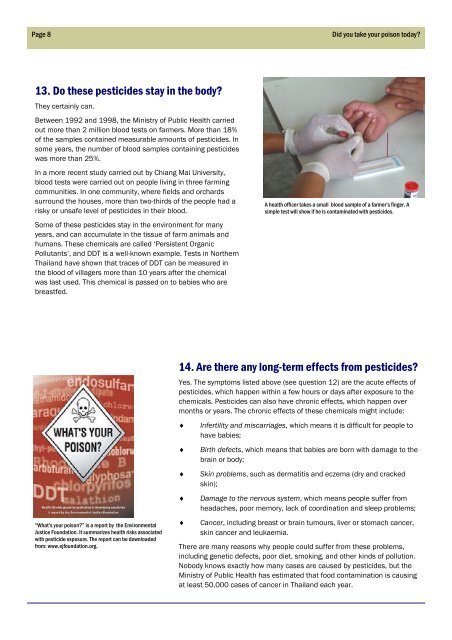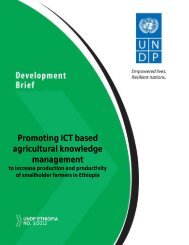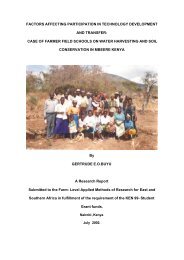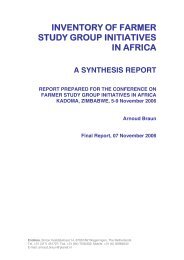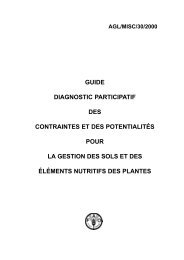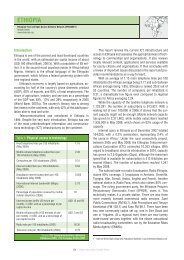Did you take your poison today? - Integrated Pest Management in ...
Did you take your poison today? - Integrated Pest Management in ...
Did you take your poison today? - Integrated Pest Management in ...
You also want an ePaper? Increase the reach of your titles
YUMPU automatically turns print PDFs into web optimized ePapers that Google loves.
Page 8<br />
<strong>Did</strong> <strong>you</strong> <strong>take</strong> <strong>you</strong>r <strong>poison</strong> <strong>today</strong>?<br />
13. Do these pesticides stay <strong>in</strong> the body?<br />
They certa<strong>in</strong>ly can.<br />
Between 1992 and 1998, the M<strong>in</strong>istry of Public Health carried<br />
out more than 2 million blood tests on farmers. More than 18%<br />
of the samples conta<strong>in</strong>ed measurable amounts of pesticides. In<br />
some years, the number of blood samples conta<strong>in</strong><strong>in</strong>g pesticides<br />
was more than 25%.<br />
In a more recent study carried out by Chiang Mai University,<br />
blood tests were carried out on people liv<strong>in</strong>g <strong>in</strong> three farm<strong>in</strong>g<br />
communities. In one community, where fields and orchards<br />
surround the houses, more than two-thirds of the people had a<br />
risky or unsafe level of pesticides <strong>in</strong> their blood.<br />
Some of these pesticides stay <strong>in</strong> the environment for many<br />
years, and can accumulate <strong>in</strong> the tissue of farm animals and<br />
humans. These chemicals are called ‘Persistent Organic<br />
Pollutants’, and DDT is a well-known example. Tests <strong>in</strong> Northern<br />
Thailand have shown that traces of DDT can be measured <strong>in</strong><br />
the blood of villagers more than 10 years after the chemical<br />
was last used. This chemical is passed on to babies who are<br />
breastfed.<br />
A health officer <strong>take</strong>s a small blood sample of a farmer’s f<strong>in</strong>ger. A<br />
simple test will show if he is contam<strong>in</strong>ated with pesticides.<br />
“What’s <strong>you</strong>r <strong>poison</strong>?” is a report by the Environmental<br />
Justice Foundation. It summarizes health risks associated<br />
with pesticide exposure. The report can be downloaded<br />
from: www.ejfoundation.org.<br />
14. Are there any long-term effects from pesticides?<br />
Yes. The symptoms listed above (see question 12) are the acute effects of<br />
pesticides, which happen with<strong>in</strong> a few hours or days after exposure to the<br />
chemicals. <strong>Pest</strong>icides can also have chronic effects, which happen over<br />
months or years. The chronic effects of these chemicals might <strong>in</strong>clude:<br />
♦<br />
♦<br />
♦<br />
♦<br />
♦<br />
Infertility and miscarriages, which means it is difficult for people to<br />
have babies;<br />
Birth defects, which means that babies are born with damage to the<br />
bra<strong>in</strong> or body;<br />
Sk<strong>in</strong> problems, such as dermatitis and eczema (dry and cracked<br />
sk<strong>in</strong>);<br />
Damage to the nervous system, which means people suffer from<br />
headaches, poor memory, lack of coord<strong>in</strong>ation and sleep problems;<br />
Cancer, <strong>in</strong>clud<strong>in</strong>g breast or bra<strong>in</strong> tumours, liver or stomach cancer,<br />
sk<strong>in</strong> cancer and leukaemia.<br />
There are many reasons why people could suffer from these problems,<br />
<strong>in</strong>clud<strong>in</strong>g genetic defects, poor diet, smok<strong>in</strong>g, and other k<strong>in</strong>ds of pollution.<br />
Nobody knows exactly how many cases are caused by pesticides, but the<br />
M<strong>in</strong>istry of Public Health has estimated that food contam<strong>in</strong>ation is caus<strong>in</strong>g<br />
at least 50,000 cases of cancer <strong>in</strong> Thailand each year.


